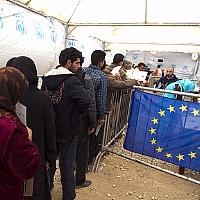(VALLETTA) – Asylum applications in the EU increased in the first five months of 2019, though an annual report out Monday showed a decrease for the third consecutive year in 2018, returning to pre-crisis levels.
The 2018 Annual Report on the Situation of Asylum in the EU+, launched by the European Asylum Support Office (EASO) on 24 June, aims to provide a comprehensive overview of the situation of asylum in the EU+ and the practical functioning of the Common European Asylum System (CEAS).
As reported by EASO earlier this year, the 664,480 applications for international protection in the EU+ in 2018 marked a decrease for the third consecutive year, this time by 10%. Approximately 9% of these applications involved repeated applicants. While the number of applications remained remarkably stable throughout 2018, the relative stability at EU+ level conceals stark variation between Member States and between individual citizenships.
The total EU+ recognition rate in first instance in 2018 was 39%, decreasing by 7 percentage points over the previous year. Although fewer positive decisions were issued overall, a higher proportion of positive decisions granted refugee status (55% of positive decisions).
Syria (13%), Afghanistan and Iraq (7% each) were the three main countries of origin of applicants in the EU+ in 2018. The top 10 citizenships of origin also included Pakistan, Nigeria, Iran, Turkey (4% each), Venezuela, Albania and Georgia (3% each). In 2018, close to one fifth of all applications were lodged by nationals from countries exempt from visa requirements to enter the Schengen Area, including Venezuelans, Colombians, Albanians and Georgians.
With regard to receiving countries, in 2018, most applications for asylum were lodged in Germany, France, Greece, Italy, and Spain. Together, these five countries accounted for almost three quarters of all applications lodged in the EU+.
Germany received the most applications (184,180) for the seventh consecutive year, despite a 17% decrease compared to 2017. Applications in France increased for the fourth consecutive year, reaching 120,425 in 2018, the highest level recorded in France to date. Greece became the country with the third-highest number of applications lodged in the EU+ in 2018, increasing for the fifth consecutive year, to 66 965 applications.
The top five receiving countries per capita were Cyprus, Greece, Malta, Sweden, and Luxembourg.
At the end of 2018, pending cases remained high, with approximately 896,560 applications awaiting a final decision in the EU+. This represented only a modest 6% decrease compared to the end of 2017.
In the first five months of 2019, more than 290,000 applications for international protection were registered in the EU+. This equates to an 11% increase over the same period in 2018. During this period, the main countries of origin were Syria (8%), Afghanistan and Venezuela (both 7%), together accounting for almost one in four applications in the EU+.
This period also saw an increase in applications recorded by Latin American nationals. Venezuelan nationals lodged some 18 400 asylum applications, roughly twice as many as during the same period in 2018, while Colombian nationals lodged three times as many applications. Increases were also recorded from nationals of El Salvador, Honduras, Nicaragua and Peru.
The EASO says the increase in early 2019 should be taken within the context of the dramatic fall in applications over the past three years, most notably the return to 2014 levels last year. It adds that there is no indication at this stage that the recent moderate increase in applications constitute a significant shift in overall trends as monthly fluctuations are normal.



